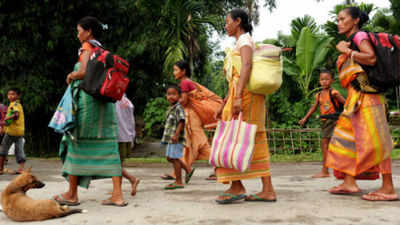- News
- Muslims valued only for votes in the Bodo areas?
This story is from April 9, 2016
Muslims valued only for votes in the Bodo areas?

Groups of refugees poured into relief camps after ethnic violence in Bodo heartlands in 2012.
KOKRAJHAR: Hundreds of Bengali-speaking Muslims displaced during the ethnic violence orchestrated by National Democratic Front of Bodoland (NDFB) militants in the Bodo heartland in 2012 are yet to get homes. Their resettlement is still a distant dream as the Bodos are at loggerheads with them over possession of land.
Yet both national and Bodo parties want their votes, for they can be the deciding factor in these election.Muslim voters make up over 15% votes in the Bodoland Territorial Council (BTC) area. In Kokrajhar (West), Muslims (55,000) outnumber Bodo voters (38,000). Kokrajhar (East) has over 35,000 Muslim voters. Most of these Bengali-speaking Muslims migrated from other districts, some own land. More than 500 Bodos, Muslims and adivasis were killed by Bodo militants in clashes between 1993 and 2012. Barring the NDFB (Songbijit) faction, all groups were disbanded or have joined the peace process. The 46-member BTC is ruled by Bodoland People’s Front (BPF), a BJP ally.
In the 2012 violence, over a lakh Muslim families were displaced. About half were relocated in other districts. BTC agreed to rehabilitate only 11,000 families. The rest live in camps. BTC has banned ‘settlements’ for Muslims on vacant grazing grounds.
“We don’t want them (Muslims) here. Their presence means violence again by militants. We too live in fear,” says Harishankar Brahma, an eldery villager of Athiaguri.
At Athiaguri, seven families had to move to a camp after NDFB rebels torched their homes. “I have my land but can’t go back,” says Ataur Rahman (65). “For the LS election, we went to the village to vote on the insistence of political parties. Our names are enlisted on the rolls there.” But 155 families in a relief camp south of Kokrajhar town boycotted the 2014 LS election. “We requested authorities to change our polling station. Political parties pleaded with us to vote there but when I sought security, nobody gave any guarantee. We decided to boycott the polls,” says Md Neamat Ali at the Parogura camp. They trust no party, be it AIUDF, BPF or Congress.
“We are not concerned about the change of guard in Dispur. We want a paribartan in our lives. We want to return home. Candidates came to us for votes this time, too. But we want a permanent solution. We don’t want to live only for voting,” Azizul Hoque, another camp inmate, says.
Yet both national and Bodo parties want their votes, for they can be the deciding factor in these election.Muslim voters make up over 15% votes in the Bodoland Territorial Council (BTC) area. In Kokrajhar (West), Muslims (55,000) outnumber Bodo voters (38,000). Kokrajhar (East) has over 35,000 Muslim voters. Most of these Bengali-speaking Muslims migrated from other districts, some own land. More than 500 Bodos, Muslims and adivasis were killed by Bodo militants in clashes between 1993 and 2012. Barring the NDFB (Songbijit) faction, all groups were disbanded or have joined the peace process. The 46-member BTC is ruled by Bodoland People’s Front (BPF), a BJP ally.
In the 2012 violence, over a lakh Muslim families were displaced. About half were relocated in other districts. BTC agreed to rehabilitate only 11,000 families. The rest live in camps. BTC has banned ‘settlements’ for Muslims on vacant grazing grounds.
“We don’t want them (Muslims) here. Their presence means violence again by militants. We too live in fear,” says Harishankar Brahma, an eldery villager of Athiaguri.
But come elections, parties welcome them, even offering “conveyance to the polling stations,” says a BPF supporter.
At Athiaguri, seven families had to move to a camp after NDFB rebels torched their homes. “I have my land but can’t go back,” says Ataur Rahman (65). “For the LS election, we went to the village to vote on the insistence of political parties. Our names are enlisted on the rolls there.” But 155 families in a relief camp south of Kokrajhar town boycotted the 2014 LS election. “We requested authorities to change our polling station. Political parties pleaded with us to vote there but when I sought security, nobody gave any guarantee. We decided to boycott the polls,” says Md Neamat Ali at the Parogura camp. They trust no party, be it AIUDF, BPF or Congress.
“We are not concerned about the change of guard in Dispur. We want a paribartan in our lives. We want to return home. Candidates came to us for votes this time, too. But we want a permanent solution. We don’t want to live only for voting,” Azizul Hoque, another camp inmate, says.
End of Article
FOLLOW US ON SOCIAL MEDIA

